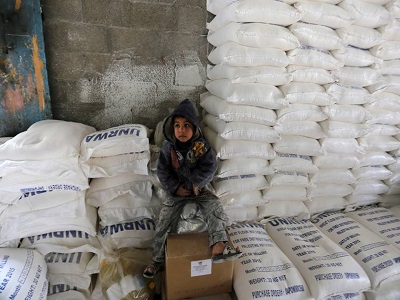
A spokesman for United Nations Secretary-General Antonio Guterres made a statement at a press briefing at the UN Headquarters in New York on Tuesday, warning that the World Food Program (WFP) would be forced to suspend assistance to some 150,000 Palestinians in the occupied West Bank and besieged Gaza Strip next month unless additional funding is provided.
Stephane Dujarric said in his statement that the WFP “urgently requires” $6.6 million in order to continue providing food assistance for the “poorest non-refugee families” in Gaza and the West Bank through vouchers over the next three months.
“A disruption of WFP assistance could further undermine food security and deepen the dire living conditions of the poorest families, most of whom live on less than $3.20 a day,” Dujarric noted.
150,000 #Palestinians may lose #food_assistance in July, says #UN https://t.co/SNLIilK3y7
— Gaza Post (@gazapost_e) June 14, 2017
Dujarric added that the WFP had warned that unless additional funding “quickly arrives,” it would be forced to suspend its food assistance voucher program for the month of July, leaving 150,000 Palestinians in Gaza and the West Bank, the majority of whom are women and children, without any food assistance.
Dujarric also noted how this reduction in food assistance would contribute to the already crippling humanitarian situation in the besieged Gaza Strip, which is experiencing a “major energy crisis.” Leaders have warned that a dire humanitarian situation is pending in the coastal enclave after Israeli authorities approved reducing Gaza’s electricity supply by 40 percent on Monday, upon the request of the Palestinian Authority (PA).
Palestinians in Gaza had already been coping with a crippling power crisis and daily, hours-long blackouts, while several districts have only been receiving four hours of electricity a day.
The United Nations Assistance to #Palestinians in #WestBank & #Gaza #oPt #UN #UNCT pic.twitter.com/Fe1Wajjd9q
— UNSCO (@UNSCO_MEPP) January 18, 2017
The International Committee of the Red Cross (ICRC) and the United Nations (UN) Office for the Coordination of Humanitarian Affairs (OCHA) released reports this month, warning of a full-on crisis should the situation in Gaza continue on its current trajectory.
Dujarric’s statement also came on the heels of Netanyahu’s demands to shutter UNRWA, the UN agency responsible for providing services to some five million Palestinian refugees, and calling for the organization to be integrated into the UNHCR – the UN High Commissioner for Refugees – after a tunnel was found beneath two UNRWA schools in central Gaza.
On Tuesday, Bo Schack, the director of UNRWA’s operations in the Gaza Strip, rejected Netanyahu’s statements and added that UNRWA was established by a UN General Assembly resolution and that an individual government did not have the power to dismantle it.
The no. of refugees in Gaza receiving UN food assistance jumped from 80k in 2000 to 930k in 2016; a 12-fold increase https://t.co/ef0LqHKfaF
— Mohammed S. Samhouri (@msamhouri) November 28, 2016
UNRWA spokesman Chris Gunness also responded to Netanyahu’s comments on Sunday by noting that UNRWA’s fate was decided only by the UN General Assembly, which extended the agency’s mandate by three years in December “by a large majority.”
Gunness added that the issue of Palestinian refugees – who number an estimated 6.5 million according to legal NGO BADIL – could only be resolved through a negotiated end to the Israeli-Palestinian refugee conflict, instead of shuttering an aid agency catering to their humanitarian needs.
“The situation of Palestine refugees needs to be resolved as part of a political resolution of the conflict between Israelis and Palestinians,” Gunness added. “It is time for political action to resolve this long-standing crisis.”
Statement on the Israeli occupation by UNSG @antonioguterres https://t.co/RAwHFa8hah RT
— Chris Gunness (@ChrisGunness) June 6, 2017
According to UNRWA, 80 percent of Palestinians in Gaza are dependent on humanitarian assistance, as the two million Palestinians in the Gaza Strip are sealed inside the coastal enclave due to a military blockade imposed by Israel and upheld by Egypt on the southern border, which turned 10 years old in June.
(Maan, PC, Social Media)




